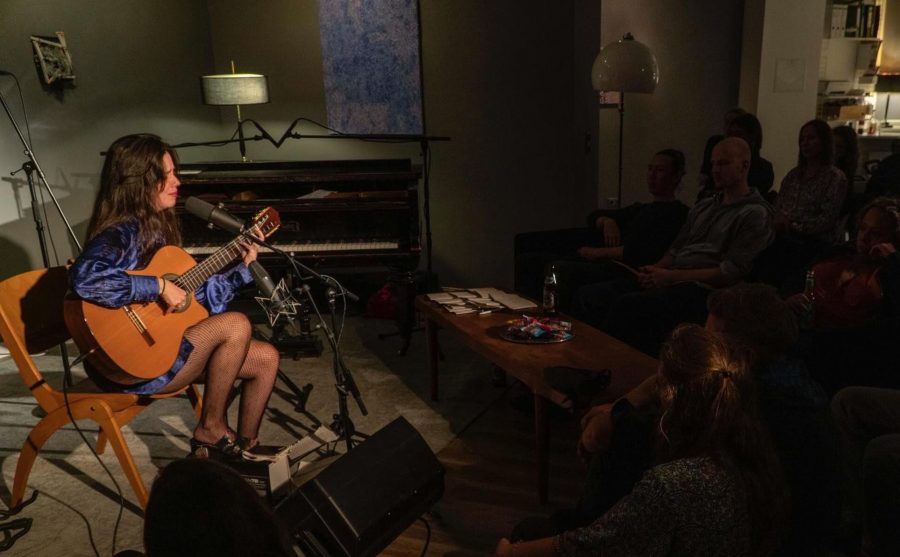35 eager (vaccinated, tested) concertgoers snuggled into the cozy interior of FRAMED Berlin, a cultural salon and gallery in the Friedrichshain district. Berlin’s long summer was coming to a close and couples nestled in corners, wine in hand, and closed their eyes to focus on the sparkled sounds of Spanish guitar and a soaring voice floating lightly in the air.
The concertgoers were there to see Lau Noah, an ethereally talented singer and composer from New York City by way of Catalonia. Singing her original songs accompanied by her own virtuosic classical guitar playing, Noah was transfixing, and the attendees were transfixed. At Noah’s performance, the end of each song was punctuated by a “wooow” from the audience, an “mmm,” bombastic claps that felt almost spiritual in their appreciation. Surely her singular talent and the intimate performance space facilitated these strong emotional responses, but I also think there is something special in this city that fosters a unique relationship between being and listening. Music in Berlin feels felt and received in a way I’ve never seen before. In Berlin, music feels embodied, cherished, beloved.
As an intern for FRAMED Berlin, I am lucky enough to be able to attend intimate performances such as Noah’s on a regular basis. Hidden in the corner after working the door and shuffling attendees into the space, I get to immerse myself in the music just like any other concertgoer. I came to Berlin with limited knowledge of its arts scene and the internship I acquired through BCB’s Internship Program has facilitated a way for me to engage with Berlin’s unique culture. Working at FRAMED has allowed me to see the city at a granular level, not just with the sweeping gaze of a tourist. And the focus of my granular noticing has largely fallen on the music that fills this city.
Back in my hometown, Los Angeles, I go out to see music and dance every weekend. The events I attend are typically DJ sets at local venues or house parties. While the music culture in Los Angeles is impossibly diverse, I tend to expect to hear popular music in some form when going out. Be it the popular sounds of today or from years ago, I look forward to mouthing along to something I know, to revel in the cathartic familiarity of songs that those around me can identify and already love. It is an act of communal recognition, of collective cultural comfort.
In Berlin, where I am studying on exchange and where techno reigns as the soundtrack to the city, it seems as if music serves an entirely different purpose. With pulsing kick drums and ever morphing synths and sounds, dancing to music here is not an act of collective recognition, but one of transcendence. The sounds repeat, lull and then propulse you forward. People dance, not in a form of gregarious sociality, but in repetitive motions that are closer to meditation than exaltation. Music here is embodied, religious, felt.
Just as the attendees at FRAMED cooed at the end of each song sung by Lau Noah, closed their eyes to feel the sonics move across their skin, I’ve noticed others take music into their whole bodies in clubs and dance floors throughout Berlin. They let it settle into them and move them from inside.
Dancing in this mode is social of course, as nightlife tends to be, but it is primarily bodily. The music and the body are the primary focus here, whereas in Los Angeles I often felt that music is a mere vehicle for me to wink at those around myself, to smile at the memory that a particular song evokes and then participate in the making of a new one.
Music can be a thing to be revered or something to be listened to in hushed and serious tones. It can be a private matter or a public necessity. Of course relationships to music differ individually everywhere, but there are real tendencies in cities, countries, and subcultures as to the role that music takes in a culture. And how cultures treat music can tell us a great deal about how that culture views sociality, pleasure, novelty and tradition. The intent listeners I witnessed at FRAMED, the ecstatic, transcendent dancing I’ve seen in Berlin clubs, has shown me that music is not a passive artform in Berlin. Music is revered and listened to – it is treated as a sacred, whole-bodied experience.
As a music producer and a composer, and as someone who studies the many roles that music takes on in our social cultures, I cannot help but make note of what I’ve seen here in Berlin. This, I believe, is the value of traveling and living abroad; I move outside of my comfort zone and then see that same zone anew. I wonder if I will seek out music as transcendence when I go home. Or maybe culture and place are immovable totems and I should simply enjoy the ride.


Gorgeous piece Tobias!! x
Thank you Naama!
Your responses are beautifully expressed. I loved reading about your thoughts and feelings.
Dear Tobias, what a beautiful piece of writing and observation. I am so happy to hear that the this feeling of tremendous respect we have at FRAMED to music/art and their roll in life in coming though. Your internship at Framed is of great value and I appreciate it a lot. Thank you (: